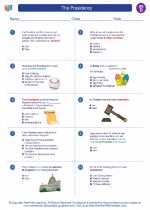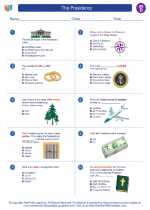The Presidency
The presidency is a crucial component of the United States government, serving as the head of the executive branch. The president is responsible for carrying out and enforcing federal laws, as well as directing national policy. This position holds significant power and influence, with the ability to shape the country's domestic and foreign policies, appoint key officials, and represent the United States on the global stage.
Roles and Responsibilities of the President
1. Chief Executive: The president is responsible for ensuring that the laws of the United States are faithfully executed. This involves overseeing the various executive branch agencies and departments.
2. Commander-in-Chief: The president is the supreme commander of the U.S. military, with the authority to deploy troops and make key military decisions.
3. Chief Diplomat: The president represents the United States in international affairs, conducting foreign policy, negotiating treaties, and engaging in diplomatic relations with other countries.
4. Legislative Leader: The president has the power to propose legislation to Congress, as well as the authority to sign or veto bills passed by the legislative branch.
5. Head of State: The president serves as the symbolic representative of the United States, performing ceremonial duties and embodying the values and ideals of the nation.
Qualifications and Election Process
To be eligible for the presidency, a candidate must meet the following qualifications:
- Be a natural-born citizen of the United States
- Be at least 35 years old
- Have been a resident of the United States for at least 14 years
The president is elected to a four-year term through the Electoral College. Citizens vote for electors who then cast their votes for the president. The candidate who receives a majority of electoral votes (270 out of 538) becomes the president.
Study Guide
Here are some key points to focus on when studying the presidency:
- What are the main roles and responsibilities of the president?
- How does the president interact with the other branches of government (legislative and judicial)?
- What are the qualifications for becoming president?
- What is the Electoral College, and how does the presidential election process work?
- Who are some notable presidents in U.S. history, and what were their significant achievements?
Understanding the presidency is essential for grasping the functioning of the U.S. government and its impact on both domestic and international affairs.
.◂Social Studies Worksheets and Study Guides Fourth Grade. The Presidency

 Worksheet/Answer key
Worksheet/Answer key
 Worksheet/Answer key
Worksheet/Answer key
 Worksheet/Answer key
Worksheet/Answer key
